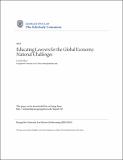|
Reseña:
|
This essay addresses the challenge of educating law students to work in an increasingly global context. For students enrolled in United States law school, insight into the ways in which globalization matters can be drawn from the structural approaches to globalization of US-based law firms. These firms pursue their international practices by integrating lawyers educated and licensed in the firm’s home country (the US) and in the host jurisdictions in which the firm has offices. As a result, the success of the firm in its international practice depends upon the ability of its lawyers to develop strong and effective cross-national relationships. Cross-national relationships inform not just colleagues within a firm, but also relationships with local counsel and counterparts who may take adversarial roles. To be successful working in a global context, lawyers must develop a global legal literacy. This includes at least four elements: language, cultural fluency, an appreciation for the role of lawyers, and law itself. While courses in comparative, international and transnational law have proliferated in US law schools and certainly are useful background for international practice, they miss the mark in teaching global legal literacy, which requires expertise in developing and using relationships that cross borders. Even clinical programs and intern- and externships maintain the boundaries around American JD students, on the one hand, and international students (typically enrolled in LLM programs), on the other hand. But these boundaries are exactly the challenge: by integrating their American JD and international student populations, schools might structure opportunities for each group to learn from the other. With existing resources, then, US law schools could expose their domestic students to the challenges of communicating in a global context, offer them an opportunity to learn from peers whose first degree in law was earned in a different national legal system, and facilitate lessons involving variations in the role of lawyers in different countries.
Reseña: This essay addresses the challenge of educating law students to work in an increasingly global context. For students enrolled in United States law school, insight into the ways in which globalization matters can be drawn from the structural approaches to globalization of US-based law firms. These firms pursue their international practices by integrating lawyers educated and licensed in the firm’s home country (the US) and in the host jurisdictions in which the firm has offices. As a result, the success of the firm in its international practice depends upon the ability of its lawyers to develop strong and effective cross-national relationships. Cross-national relationships inform not just colleagues within a firm, but also relationships with local counsel and counterparts who may take adversarial roles. To be successful working in a global context, lawyers must develop a global legal literacy. This includes at least four elements: language, cultural fluency, an appreciation for the role of lawyers, and law itself. While courses in comparative, international and transnational law have proliferated in US law schools and certainly are useful background for international practice, they miss the mark in teaching global legal literacy, which requires expertise in developing and using relationships that cross borders. Even clinical programs and intern- and externships maintain the boundaries around American JD students, on the one hand, and international students (typically enrolled in LLM programs), on the other hand. But these boundaries are exactly the challenge: by integrating their American JD and international student populations, schools might structure opportunities for each group to learn from the other. With existing resources, then, US law schools could expose their domestic students to the challenges of communicating in a global context, offer them an opportunity to learn from peers whose first degree in law was earned in a different national legal system, and facilitate lessons involving variations in the role of lawyers in different countries.
|

